
Gerard Adams is an Irish republican politician who was the president of Sinn Féin between 13 November 1983 and 10 February 2018, and served as a Teachta Dála (TD) for Louth from 2011 to 2020. From 1983 to 1992 and from 1997 to 2011, he followed the policy of abstentionism as a Member of Parliament (MP) of the British Parliament for the Belfast West constituency.
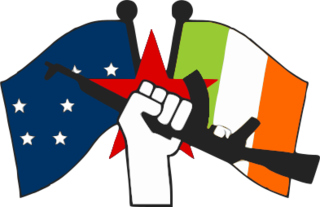
The Irish National Liberation Army is an Irish republican socialist paramilitary group formed on 8 December 1974, during the 30-year period of conflict known as "the Troubles". The group seeks to remove Northern Ireland from the United Kingdom and create a socialist republic encompassing all of Ireland. With membership estimated at 80–100 at their peak, it is the paramilitary wing of the Irish Republican Socialist Party (IRSP).
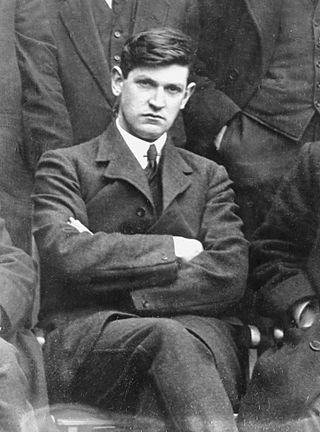
Michael Collins was an Irish revolutionary, soldier and politician who was a leading figure in the early-20th century struggle for Irish independence. During the War of Independence he was Director of Intelligence of the Irish Republican Army (IRA) and a government minister of the self-declared Irish Republic. He was then Chairman of the Provisional Government of the Irish Free State from January 1922 and commander-in-chief of the National Army from July until his death in an ambush in August 1922, during the Civil War.
"Stakeknife" was the code name of a high-level spy who successfully infiltrated the Provisional Irish Republican Army (IRA) while working for the Force Research Unit (FRU), a British military intelligence unit. Stakeknife allegedly worked as an FRU informant for 25 years.
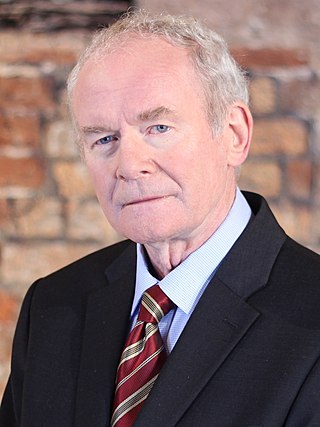
James Martin Pacelli McGuinness was an Irish republican politician and statesman for Sinn Féin and a leader within the Provisional Irish Republican Army (IRA) during The Troubles. He was the deputy First Minister of Northern Ireland from May 2007 to January 2017.

The Irish People's Liberation Organisation was a small Irish socialist republican paramilitary organisation formed in 1986 by disaffected and expelled members of the Irish National Liberation Army (INLA), whose factions coalesced in the aftermath of the supergrass trials. It developed a reputation for intra-republican and sectarian violence as well as criminality, before being forcibly disbanded by the Provisional Irish Republican Army (IRA) in 1992.
Sean O'Callaghan was a member of the Provisional Irish Republican Army (IRA), who from the late 1970s to the mid-1980s worked against the organisation from within as a mole for the Irish Government with the Garda Síochána's Special Branch.
Frederico "Freddie" Scappaticci b.12 January 1946 d. April 2023, was an Irish IRA member named in the Kenova report, as a British Intelligence mole with the codename ‘Stakeknife’.

The Irish Republican Army (IRA) of 1922–1969, an anti-Treaty sub-group of the original Irish Republican Army (1919–1922), fought against the British-backed Irish Free State in the Irish Civil War, and its successors up to 1969, when the IRA split again into the Provisional IRA and Official IRA. The original Irish Republican Army fought a guerrilla war against British rule in Ireland in the Irish War of Independence between 1919 and 1921. Following the signing of the Anglo-Irish Treaty on 6 December 1921, the IRA in the 26 counties that were to become the Irish Free State split between supporters and opponents of the Treaty. The anti-Treatyites, sometimes referred to by Free State forces as "Irregulars", continued to use the name "Irish Republican Army" (IRA) or in Irish Óglaigh na hÉireann, as did the organisation in Northern Ireland which originally supported the pro-Treaty side. Óglaigh na hÉireann was also adopted as the name of the pro-Treaty National Army, and remains the official legal title of the Irish Defence Forces.
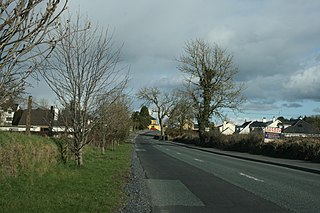
Ballinalee, sometimes known as Saint Johnstown, is a village in north County Longford, Ireland. It is situated on the River Camlin, and falls within the civil parish of Clonbroney. As of the 2016 census, the village had a population of 347 people.

Thomas Power was an Irish republican socialist, also known as Ta Power, who was a leading member of the Irish Republican Socialist Party (IRSP) and Irish National Liberation Army (INLA). According to the Irish Republican Socialist Movement (IRSM) biography page on Power, he was from Friendly Street in the Markets area of south Belfast, where he had become an activist. He had originally joined the Official IRA but transferred allegiance to the INLA in 1975 while a prisoner in Long Kesh, along with 20 other men.

The Loughgall ambush took place on 8 May 1987 in the village of Loughgall, County Armagh, Northern Ireland. An eight-man unit of the Provisional Irish Republican Army (IRA) launched an attack on the Royal Ulster Constabulary (RUC) base in the village. An IRA member drove a digger with a bomb in its bucket through the perimeter fence, while the rest of the unit arrived in a van and fired on the building. The bomb exploded and destroyed almost half of the base. Soldiers from the British Army's Special Air Service (SAS) then returned fire both from within the base and from hidden positions around it in a pre-planned ambush, killing all of the attackers. Two of them were subsequently found to have been unarmed when they were killed.
Terence Gerard 'Gerry' McGeough is a prominent Irish republican who was a volunteer in the Provisional Irish Republican Army (IRA), a former Sinn Féin activist and editor of the defunct The Hibernian magazine. McGeough broke with Sinn Féin in 2001 and he is now an independent Irish Catholic/nationalist activist. McGeough was set to serve 20 years imprisonment after being found guilty in 2011 for attempted murder, although he was released two years later, on 29 January 2013, under the Good Friday Agreement.

Patrick Joseph Kelly, was an Irish commander of the East Tyrone Brigade of the Provisional Irish Republican Army during the mid-1980s until his death in a Special Air Service ambush at Loughgall, County Armagh in May 1987.

Seán Mac Stíofáin was an English-born chief of staff of the Provisional IRA, a position he held between 1969 and 1972.

Robert Seymour was a Northern Irish loyalist from Belfast who was a member of the Ulster Volunteer Force (UVF). He served as the paramilitary organisation's East Belfast commander before being shot dead by the Provisional IRA behind his video shop in that part of the city in June 1988. His killing was claimed to be in retaliation for the UVF bombing of a nationalist pub in which three Catholics died.
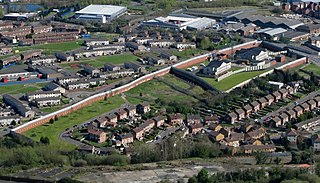
The Battle at Springmartin was a series of gun battles in Belfast, Northern Ireland on 13–14 May 1972, as part of The Troubles. It involved the British Army, the Provisional Irish Republican Army (IRA), and the Ulster Volunteer Force (UVF).
Paul Quinn was a young man from County Armagh, Northern Ireland, who was murdered in 2007. His family subsequently accused the Provisional Irish Republican Army (IRA) of his murder, though no one has ever been convicted in relation to his death.

Tarlach Ó hUid was an English-born Irish language activist, journalist and writer who became a member of the Irish Republican Army during World War II.














